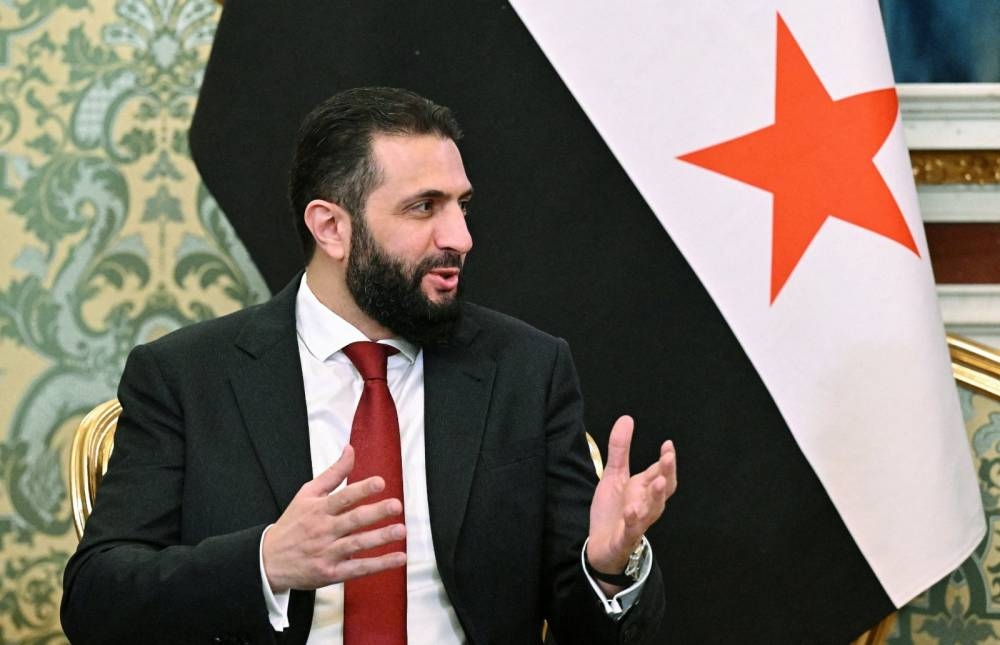World
US and UK Lift Sanctions on Syrian President Ahmad al-Sharaa

The United States and the United Kingdom have lifted sanctions on Syrian President Ahmad al-Sharaa, a decision announced on March 15, 2024. This move followed the UN Security Council’s decision to remove similar restrictions a day earlier, ahead of al-Sharaa’s scheduled meeting with US President Donald Trump next week. The European Union has indicated that it will also amend its measures in response to these developments.
In addition to al-Sharaa, sanctions on Syria’s interior minister, Anas Khattab, were also lifted. Both officials had been previously designated as Specially Designated Global Fighters due to their associations with Islamic State and Al Qaeda. The sanctions included financial restrictions aimed at curtailing their activities. A spokesperson for the European Union confirmed that the UN’s recent actions would be mirrored in the EU’s own regulations.
Shifting Political Landscape
The lifting of sanctions marks a significant shift in policy, particularly for Washington, which has pushed for months for the Security Council to ease restrictions on Syria. In May 2023, President Trump hinted at a major policy adjustment, stating intentions to lift US sanctions on Syria. The planned meeting between Trump and al-Sharaa at the White House on March 18 is a historic occasion, as it represents the first visit by a Syrian head of state in recent years.
This political shift comes after al-Sharaa’s ascension to the presidency in January 2023, following the ousting of Bashar al-Assad by forces led by Hayat Tahrir al-Sham. Al-Sharaa’s government is actively working to restore Syria’s international relationships, which had been strained during Assad’s tenure. Notably, al-Sharaa, previously known as Abu Mohammad al-Julani, has made several foreign trips to reinforce Syria’s diplomatic standing.
The UN Security Council’s decision to lift sanctions was grounded in the assertion that there were no active ties between Hayat Tahrir al-Sham and Al Qaeda. This conclusion has paved the way for easing restrictions that had been in place since 2013 for the United States and since 2014 for the UK and UN. The sanctions included travel bans, asset freezes, and arms embargoes.
Future Implications
In a statement, a spokesperson for the European Commission emphasized the commitment to supporting a peaceful and inclusive transition in Syria. They expressed hope for a future that benefits all Syrians, indicating that the geopolitical dynamics in the region are evolving.
The Syrian government has yet to respond to requests for comments regarding these recent developments, with reports indicating that March 15 is not a working day in Syria. As international relations shift, the focus remains on how these changes will impact the Syrian population and the broader Middle East landscape.
The lifting of sanctions suggests a potential thaw in diplomatic relations, raising questions about future engagements between Syria and Western powers.
-

 Entertainment2 months ago
Entertainment2 months agoAnn Ming Reflects on ITV’s ‘I Fought the Law’ Drama
-

 Entertainment3 months ago
Entertainment3 months agoKate Garraway Sells £2 Million Home Amid Financial Struggles
-

 Health2 months ago
Health2 months agoKatie Price Faces New Health Concerns After Cancer Symptoms Resurface
-

 Entertainment2 months ago
Entertainment2 months agoCoronation Street’s Carl Webster Faces Trouble with New Affairs
-

 Entertainment2 months ago
Entertainment2 months agoWhere is Tinder Swindler Simon Leviev? Latest Updates Revealed
-

 Entertainment3 months ago
Entertainment3 months agoKim Cattrall Posts Cryptic Message After HBO’s Sequel Cancellation
-

 Science3 weeks ago
Science3 weeks agoBrian Cox Addresses Claims of Alien Probe in 3I/ATLAS Discovery
-

 Entertainment2 months ago
Entertainment2 months agoOlivia Attwood Opens Up About Fallout with Former Best Friend
-

 Entertainment3 months ago
Entertainment3 months agoMarkiplier Addresses AI Controversy During Livestream Response
-

 Entertainment3 months ago
Entertainment3 months agoMasterChef Faces Turmoil as Tom Kerridge Withdraws from Hosting Role
-

 Entertainment4 months ago
Entertainment4 months agoSpeculation Surrounds Home and Away as Cast Departures Mount
-

 World2 months ago
World2 months agoCole Palmer’s Mysterious Message to Kobbie Mainoo Sparks Speculation




















